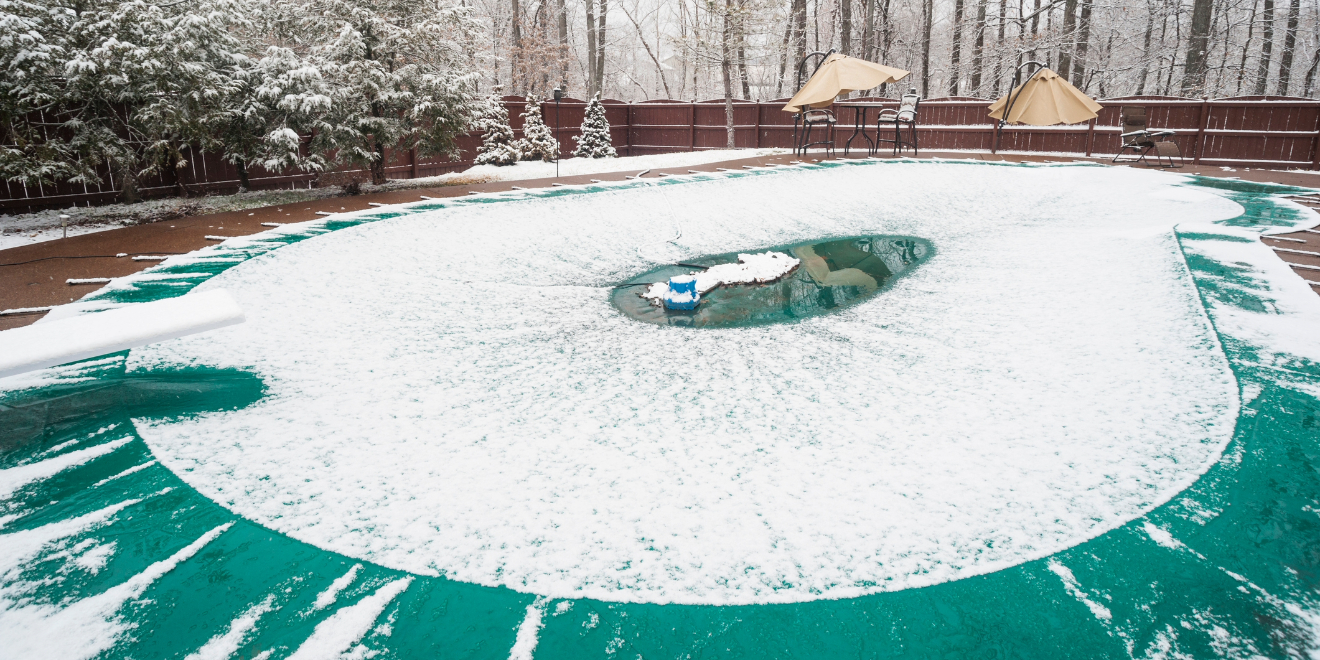Did you know that an improperly closed pool can end up costing you tens of thousands of dollars? Closing a pool takes more than pulling out the ladder and unfurling the winter cover—it’s a process that requires draining plumbing, re-balancing chemicals, and more.
An improper closing leaves your pool susceptible to plumbing, liner, and pump damage.
Learn how to close your pool for the winter to make next year’s pool season a breeze!
When to Close a Pool for Winter
The timeline for closing a pool will vary based on location. In general, when the daytime temperature is consistently below 65°F during the day. But you can choose to close your pool early—many homeowners close their pool when leaves start falling (and could clog their filter) or when students go back to school (and there’s less time for family pool days).
Ultimately, it’s important to close your pool before the danger of freezing to prevent damage to components like pool lines.
What You Need to Close Your Pool for the Winter
Pool closing requires a variety of tools and equipment, some will be familiar to pool owners, including a skimmer and vacuum. Additionally, you’ll need some basic power tools (like a drill with interchangeable bits), a water testing kit, and chemicals to balance pool levels. In addition to everyday pool chemicals, pool closing will require algaecide, shock, and anti-freeze.
How to Winterize an Inground Pool
To professionally close a pool for winter, our pool technicians will:
- Skim debris: Leaves, pollen, bugs, and any other debris in your pool water contribute to algae growth once your pool is covered.
- Clean the filter and empty the skimmer basket or net: Now that all the debris is removed from the water you may rinse or replace the pool filter and the skimmer net or basket may be emptied and rinsed.
- Test water chemistry: Using a water test kit, our team will determine the current chemical levels of the pool water. (The appropriate concentrations must be achieved during the closing process because this is the last time the water will be tested until the spring. This step is critical in determining what types and volumes of chemicals need to be added to the pool water.)
- Shock and winterize pool water: Using pool shock (high dose chlorine) and chemicals like algaecide, the pool water chemistry will be prepped for closing.
- Lower the water level: When water freezes, it expands. To help avoid any damage to your plumbing, the water level will be lowered to approximately 6 inches beneath the lowest plumbing feature—usually a jet or a skimmer.
- Clean the pool pump: Cleaning the pool pump helps to prevent the growth of algae during the fall and early spring.
- Drain the pool’s plumbing line and equipment: This might be the most important step in terms of damage prevention. Frozen plumbing is one of the most frustrating repairs for owners—because it’s preventable. All water must be drained and dried from your plumbing to avert damage from freezing.
- Securely install the winter cover: A good winter cover will be sturdy enough that any heavy precipitation won’t cause a collapse. The winter cover should be installed securely—this may require the use of power tools.
How Long Does It Take to Winterize a Pool?
The full process may take anywhere from a couple hours to a full day depending on the type and size of the pool. Regular cleaning and maintenance throughout the pool season may reduce the amount of time it takes to close the pool.
Should You Shock Your Pool Before Closing It for the Season?
Yes, many pools benefit from a shock (powerful chlorine treatment) before closing. This will inhibit the growth of algae and bacteria for the duration of its closure.
Can I Use a Tarp to Cover My Swimming Pool?
No. You should not use a standard tarp to cover your swimming pool in winter or summer. Tarps aren’t strong enough to hold the weight of heavy precipitation, and they can be a safety hazard. Choose a high-quality and seasonally appropriate pool tarp to cover your pool.
Why Opt for Professional Pool Closing?
Closing your pool for winter is a laborious and time-intensive process that will often take homeowners 2-8 hours to complete, sometimes more!
Choosing a professional pool closing company not only frees up your time, but is the best safeguard against damaged plumbing, frozen equipment, and chemical balance problems.
Stress-free Pool Closing from Your Local Experts
Ease into the winter season knowing your pool is protected from freezing temps and harmful algae or bacteria. Give yourself the peace of mind that comes from a professional closing with help from your local ASP—America’s Swimming Pool Co. Request service online or call (866) 253-0455 to get started.


